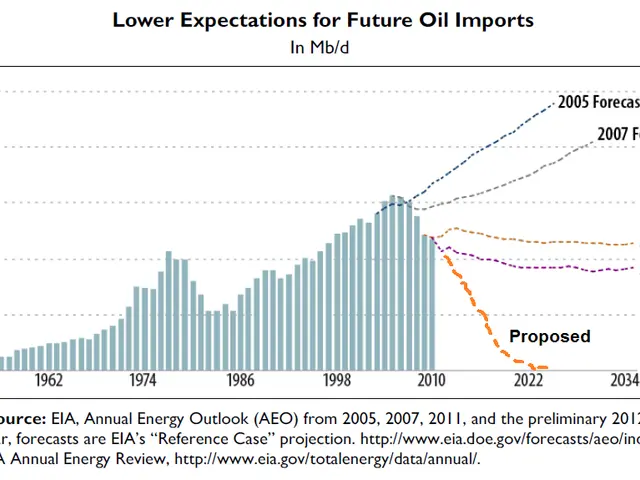This Powerful Telecommunications Titan Returned More Wealth to Shares Holders than AT&T and Verizon Combined in the Last Year, and Increased Its Dividend by 35%
Many investors are drawn to telecom sector stocks due to the substantial dividend returns offered by several companies in the field. Subscription revenue and lengthy contracts create a reliable source of disposable cash flow. Many prominent companies in the industry often choose to distribute this extra cash to their shareholders.
For instance, Verizon Communications (VZ, -0.10%) recently distributed a significant $11.2 billion to its shareholders within a 12-month period. Currently, the stock offers a tempting dividend yield of 6.6%. Meanwhile, AT&T (T, 0.80%) has undergone substantial changes, focusing solely on its telecom services. It boasts a dividend yield of 5%, having distributed $8.2 billion to its shareholders in the same time frame.
However, one of its major competitors surpasses these figures in returning cash to its shareholders. Over the past year, T-Mobile (TMUS, 1.06%) returned a staggering $11.8 billion. Although the telecom giant predominantly utilizes share buybacks in its capital return strategy, something that has been scarce at Verizon and AT&T recently.
While T-Mobile predominantly invests in share buybacks, its management announced a 35% hike in its dividend payout, currently offering a 1.6% yield. T-Mobile's extensive capital return strategy may prove more beneficial to its shareholders than sizeable dividends from its competitors.
Comparing Share Buybacks and Dividends
Management can employ two primary methods to return leftover capital to shareholders: share buybacks or dividends.
Dividends, quite straightforwardly, involve distributing a fixed amount of cash per share to shareholders, typically on a recurring schedule such as every quarter. Although management is not obligated to pay out equal amounts each time, dividends tend to be quite persistent. Companies that begin paying a certain amount often strive to maintain or exceed this level. Verizon, for example, has increased its dividend every year for the last 18 years.
On the contrary, share buybacks are an indirect way of returning cash to shareholders. Instead of distributing money, management utilizes these funds to purchase shares of the stock in either private deals or on the open market. Shareholders end up owning more equities in the company.
Another perspective to consider is that shareholders receive stock ownership instead of cash income from dividends. This is similar to a shareholder who automatically reinvestments their dividends back into the stock. However, the tax implications for share buybacks are reduced due to a lower 1% tax levied on the company rather than a 15% or higher tax rate for qualified dividends levied on shareholders.
Often, returning capital through share buybacks can yield more significant shareholder value than straightforward dividends. Therefore, investors should not underestimate T-Mobile's substantial capital returns over the past year just because it employs share buybacks instead of dividends. For long-term investors, T-Mobile's ability to reduce the number of outstanding shares will likely translate into higher dividends in the future.
T-Mobile's Long-Term Potential for Returning More Cash to Shareholders
It is one thing for a company to temporarily reduce its cash reserves through a surge in capital returns, but another to consistently generate and return more cash to shareholders consistently.
Management projects generating around $80 billion in additional investment and shareholder return capacity by 2027 by maintaining its current debt-to-equity ratio and growing its earnings before interest, taxes, depreciation, and amortization (EBITDA). The company currently has $10 billion set aside for ongoing transactions but plans to allocate $50 billion of that to shareholders. This translates to an average return of more than $15 billion annually, as per management's announcement at the end of the third quarter. Furthermore, it plans to maintain $20 billion for future investments or acquisitions, but a portion of this could be reallocated to its capital return program as well.
The lion's share of T-Mobile's capital returns will come from share buybacks, but steady dividend growth should also be expected. Management has already announced a 35% increase in dividend payouts in September. However, this will only amount to around $4 billion within a year.
Management is targeting a 20% portion of free cash flow for its dividend. Its 2027 forecast predicts $18.5 billion in free cash flow, implying around $4.6 billion in dividend payments that year. Accounting for both aggressive share buybacks and dividend growth, investors should expect annual increases of approximately 10% over the next two fiscal years, based on management's recent comments.
T-Mobile enjoys two key advantages over both AT&T and Verizon in their ability to generate and return cash to shareholders. Firstly, T-Mobile has a lesser debt burden than both competitors. Both AT&T and Verizon have made debt-financed acquisitions over the past decade that did not generate value for shareholders but left them with a considerable amount of debt. They are currently working to pay down this debt, which diverts a significant portion of their cash flow.
Secondly, T-Mobile boasts a favorable spectrum portfolio, which allows it to be more selective in new spectrum license auctions. Additionally, T-Mobile has approached fiber optics differently, opting to lease fixed-line assets rather than investing in its infrastructure. This approach saves T-Mobile on capital expenditures but comes with ongoing costs. However, T-Mobile may revise its strategy in the future, impacting its $20 billion buffer as per its long-term plans.
It's undeniable that T-Mobile shares come with a higher price tag compared to AT&T or Verizon for investors, with a 11-to-EBITDA ratio. This is significantly higher than AT&T's 7.3 and Verizon's 8.2.
However, T-Mobile anticipates an annual EBITDA growth rate of 7% from 2023 to 2027. This is more than triple the growth rate of both AT&T and Verizon. This growth is due to an increase in share gains, as T-Mobile continues to lead as the fastest-expanding wireless provider in the nation. Furthermore, T-Mobile aims to enhance the profit margin on its service revenue, with a focus on free-cash-flow conversion. It aims to achieve 25% free-cash-flow conversion by 2027, up from 21% in 2023.
The accelerated growth and improved margin should justify a higher multiple than its competitors. With the substantial share-repurchase program boosting the worth of future earnings for each remaining share, the stock appears to be fairly priced.
Those investors who seek a company dedicated to delivering consistent and growing cash flows to shareholders in the most efficient manner should give T-Mobile a second glance.
- Given the substantial returns T-Mobile has made to its shareholders through share buybacks, some investors might consider diversifying their investment portfolio by allocating funds to other finance opportunities, such as investing in mutual funds or bonds that focus on capital returns.
- As companies like T-Mobile continue to prioritize returning cash to shareholders, financial analysts may pay closer attention to the effectiveness of this approach in driving long-term shareholder value, and potential impacts on the company's financial performance and stock price.








